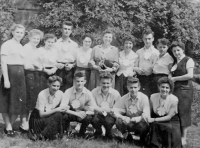I spent forty years of my life in unfreedom
Stáhnout obrázek
Karel Kavička was born on 20 June 1940 in Prostějov into a Catholic and trade family, his father was a successful baker in Čehovice. After the onset of communism, his family closed their business for fear of nationalisation of not only the bakery but also the roof over their heads. His family was a thorn in the side of the regime. His cousin, Antonín Kavička, was expelled from school after a mock trial and banned from studying for life. His uncle, Father František Šoupal, was imprisoned for alleged anti-state activities and served his sentence in the coal mines. The witness was expelled from education and had to work in heavy manual jobs until the 1989 coup. He retained his firm faith in God and inner freedom throughout the entire period of normalization. It became his firm support in life. After the revolution, he graduated from the Faculty of Theology at Palacký University. He worked at the Archbishopric of Olomouc and wrote a number of professional publications on church history and the history of church art. He was one of the main initiators of the restoration of the Marian Column in Prague‘s Old Town Square.
